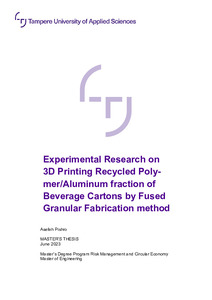Experimental research on 3D printing recycled polymer/aluminum fraction of beverage cartons by Fused Granular Fabrication method
Pishro, Asefeh (2023)
Pishro, Asefeh
2023
All rights reserved. This publication is copyrighted. You may download, display and print it for Your own personal use. Commercial use is prohibited.
Julkaisun pysyvä osoite on
https://urn.fi/URN:NBN:fi:amk-2023061323718
https://urn.fi/URN:NBN:fi:amk-2023061323718
Tiivistelmä
According to circular economy principles, material cycles of composite packages should be closed or narrowed to contribute to the EU green deal ambitions. This is achieved through the waste minimization, efficient recycling and deploying recycled materials extensively.
The circular challenge is to maximize the value creation of post-consumer beverage cartons, and at the same time narrow the material loop. However, non-fiber components of beverage carton (at least 30% of total), have been a problem for the recyclers, resulting in low recycling rate of Polymer/Aluminum (Poly-Al). The aim was to find a solution to improve circularity of Poly-Al, and also empowering recyclers by offering distributed recycling, 3D printing here to the current centralized recycling activity.
Experimental part of the study involved 3D printing tests with Poly-Al material made from recycling non-fiber fraction of beverage carton in a form of granule at lab-scale by using “Fused Granular Fabrication” (FGF) as part of the material extrusion technology. Optimal 3D printing parameters for this novel material were set up, and a tensile strength test was subsequently implemented to validate the assumptions.
As far as our knowledge goes, this study was the first to concentrate its attention on printability of Poly-Al material composed of recycled materials in large-scale niche 3D printing market by using Fused Granular Fabrication method.
This study showed that Poly-Al as a heterogeneous material mixed of varies polymers, exhibited specific thermo-physical behavior during 3D printing process because of interaction between Polymer matrix and Aluminum particles. The material unexpectedly disclosed high viscosity, high co-efficient thermal expansion and low flow rate which relatively lessened the speed of processing.
To recap, in the event of speeding up the flow rate of Poly-Al material which makes sense a rapid prototyping, the material can be broadly used as a feedstock for large scale 3D printing purpose. Thus, not only will recycling rate of Poly-Al be improved, but also profitability will be yielded by manufacturing high-quality 3D printed end-products for the dedicated recyclers.
The circular challenge is to maximize the value creation of post-consumer beverage cartons, and at the same time narrow the material loop. However, non-fiber components of beverage carton (at least 30% of total), have been a problem for the recyclers, resulting in low recycling rate of Polymer/Aluminum (Poly-Al). The aim was to find a solution to improve circularity of Poly-Al, and also empowering recyclers by offering distributed recycling, 3D printing here to the current centralized recycling activity.
Experimental part of the study involved 3D printing tests with Poly-Al material made from recycling non-fiber fraction of beverage carton in a form of granule at lab-scale by using “Fused Granular Fabrication” (FGF) as part of the material extrusion technology. Optimal 3D printing parameters for this novel material were set up, and a tensile strength test was subsequently implemented to validate the assumptions.
As far as our knowledge goes, this study was the first to concentrate its attention on printability of Poly-Al material composed of recycled materials in large-scale niche 3D printing market by using Fused Granular Fabrication method.
This study showed that Poly-Al as a heterogeneous material mixed of varies polymers, exhibited specific thermo-physical behavior during 3D printing process because of interaction between Polymer matrix and Aluminum particles. The material unexpectedly disclosed high viscosity, high co-efficient thermal expansion and low flow rate which relatively lessened the speed of processing.
To recap, in the event of speeding up the flow rate of Poly-Al material which makes sense a rapid prototyping, the material can be broadly used as a feedstock for large scale 3D printing purpose. Thus, not only will recycling rate of Poly-Al be improved, but also profitability will be yielded by manufacturing high-quality 3D printed end-products for the dedicated recyclers.
